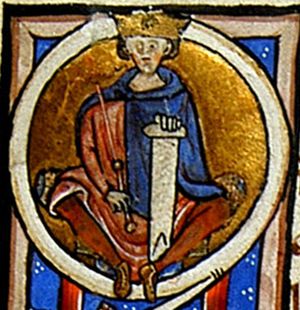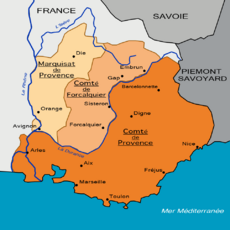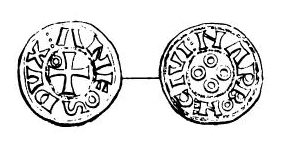Alfonso Jordan facts for kids
Quick facts for kids Alfonso Jordan |
|
|---|---|
| Count of Toulouse, Rouergue and Tripoli, Margrave of Provence and Duke of Narbonne | |

Alfonso Jordan, on a historiated initial from the first cartulary of the city of Toulouse, 1205
|
|
| Count of Tripoli | |
| Reign | 1105 – 1109 |
| Predecessor | Raymond IV |
| Successor | Bertrand of Toulouse |
| Count of Toulouse | |
| Reign | 1112 – 1148 |
| Predecessor | Bertrand of Toulouse |
| Successor | Raymond V |
| Born | 1103 Citadel of Raymond de Saint-Gilles, Tripoli |
| Died | 16 April 1148 (aged 44–45) Caesarea, Kingdom of Jerusalem |
| Spouse | Faydiva d'Uzes (m. Sep 1125) Ermengarde, Viscountess of Narbonne |
| Issue | Raymond Alphonse Faydiva Agnes Laurentia |
Alfonso Jordan (1103–1148) was an important count in medieval Europe. He was the Count of Toulouse, a powerful region in what is now France. He also held titles like Count of Rouergue, Margrave of Provence, and Duke of Narbonne. For a short time, he was even the Count of Tripoli in the Middle East.
Contents
Life of Alfonso Jordan
Early Years and Family
Alfonso was born in 1103 in a castle in Tripoli. His father, Raymond IV of Toulouse, was on the First Crusade at the time. Alfonso's mother was Elvira of Castile. He was given the name "Jourdain" because he was baptized in the Jordan River.
Alfonso's father died when he was only two years old. His cousin, William Jordan, looked after him until he was five. Then, Alfonso was taken to Europe. There, his half-brother Bertrand gave him the county of Rouergue. When Bertrand died in 1112, Alfonso became the Count of Toulouse and Margrave of Provence.
Challenges and Conflicts
In 1114, Duke William IX of Aquitaine tried to take control of Toulouse. He believed he had a right to it through his wife. Alfonso managed to get some of the land back in 1119. By 1123, he was fully in control again. However, he was excommunicated by Pope Callixtus II. This happened because he had damaged an abbey and attacked some monks.
Alfonso then had to fight for his lands in Provence. He was up against Count Raymond Berengar III of Barcelona. Their war finally ended in September 1125 with a "peace and concord" agreement. After this, Alfonso controlled a large area. It stretched from the Pyrenees mountains to the Alps, and from the Auvergne region to the sea. During his rule, art and industry in the country grew stronger.
Involvement in Spain
In March 1126, Alfonso was at the court of Alfonso VII of León. He helped Alfonso VII become king. According to old records, Alfonso Jordan helped take the city of León from opposing nobles. He then gave it to Alfonso VII. The famous poet Marcabru might have traveled with Alfonso during his visits to Spain.
By 1132, Alfonso was involved in another conflict. This time, it was a fight over the county of Melgueil. He was fighting against Berenguer Ramon, Count of Provence. Alfonso lost this short battle.
Alfonso took control of the viscounty of Narbonne in 1134. He ruled it while the Viscountess Ermengarde was still a child. He gave it back to her in 1143. In 1141, King Louis VII tried to claim Toulouse. He did this for his wife, Eleanor of Aquitaine, but he was not successful.
That same year, Alfonso Jordan went on a pilgrimage to Saint James of Compostela in Spain. While there, he suggested a peace agreement. This was between the king of León and García VI of Navarre. His idea helped lead to later peace talks.
Later Life and Crusade
In 1144, Alfonso again upset the church. He sided with the people of Montpellier against their lord. In 1145, Bernard of Clairvaux wrote to him. Bernard was worried about a heretic (someone with beliefs different from the church) in Toulouse. Bernard even went there to preach against this new belief.
Alfonso was excommunicated a second time. But in 1146, he promised to go on a crusade. This happened at a meeting in Vézelay called by Louis VII. In August 1147, he set off for the Middle East on the Second Crusade. He stopped in Italy and probably in Constantinople. He might have met Emperor Manuel I there.
Alfonso finally arrived in Acre in 1148. He died in Caesarea. Some people believed he had been poisoned. They suspected either Eleanor of Aquitaine or Melisende, the mother of King Baldwin III of Jerusalem.
Alfonso and his wife Faydiva d'Uzès had several children:
- Raymond, who became count after him
- Alphonse
- Faydiva (died 1154), who married Count Humbert III of Savoy
- Agnes (died 1187)
- Laurentia, who married Count Bernard III of Comminges
He also had an illegitimate son named Bertrand.
See Also
| Preceded by Raymond I |
Count of Tripoli 1105–1109 |
Succeeded by Bertrand |
| Preceded by Bertrand |
Count of Toulouse 1112–1148 |
Succeeded by Raymond V |
 | William Lucy |
 | Charles Hayes |
 | Cleveland Robinson |



